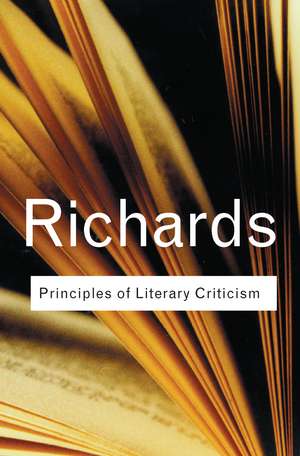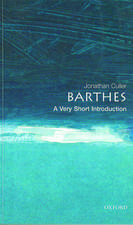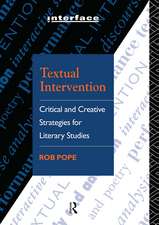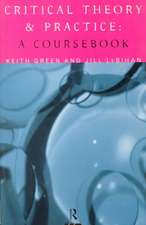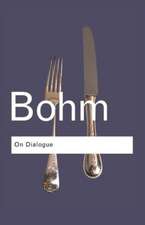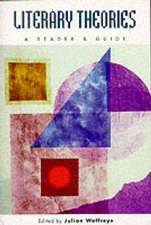Principles of Literary Criticism
Autor I.A. Richardsen Limba Engleză Paperback – 18 mai 2001
Preț: 183.91 lei
Nou
Puncte Express: 276
Preț estimativ în valută:
35.20€ • 36.98$ • 29.58£
35.20€ • 36.98$ • 29.58£
Carte disponibilă
Livrare economică 18 februarie-04 martie
Livrare express 04-08 februarie pentru 21.30 lei
Preluare comenzi: 021 569.72.76
Specificații
ISBN-13: 9781138123748
ISBN-10: 1138123749
Pagini: 296
Ilustrații: black & white illustrations
Dimensiuni: 129 x 198 x 16 mm
Greutate: 0.29 kg
Ediția:1
Editura: Taylor & Francis
Colecția Routledge
Locul publicării:Oxford, United Kingdom
ISBN-10: 1138123749
Pagini: 296
Ilustrații: black & white illustrations
Dimensiuni: 129 x 198 x 16 mm
Greutate: 0.29 kg
Ediția:1
Editura: Taylor & Francis
Colecția Routledge
Locul publicării:Oxford, United Kingdom
Public țintă
General and UndergraduateRecenzii
'To us Richards was infinitely more than a brilliantly new literary critic: he was our guide, our evangelist, who revealed to us, in a succession of astounding lightning flashes, the entire expanse of the Modern World.' - Christopher Isherwood
'Principles of Literary Criticism is an important contribution to the rehabilitation of English criticism - perhaps because of its sustained nature, the most important contribution yet made. Mr Richards begins with an account of the present chaos of critical theories and follows with an analysis of the fallacy in modern aesthetics.' - Herbert Read, Criterion
'Richards is simply the most infulential theorist of the century.' - George Watson, The Literary Critics
'To us Richards was infinitely more than a brilliantly new literary critic: he was our guide, our evangelist, who revealed to us, in a succession of astounding lightning flashes, the entire expanse of the Modern World.' - Christopher Isherwood
'Principles of Literary Criticism is an important contribution to the rehabilitation of English criticism - perhaps because of its sustained nature, the most important contribution yet made. Mr Richards begins with an account of the present chaos of critical theories and follows with an analysis of the fallacy in modern aesthetics.' - Herbert Read, Criterion
'Richards is simply the most infulential theorist of the century.' - George Watson, The Literary Critics
'To us Richards was infinitely more than a brilliantly new literary critic: he was our guide, our evangelist, who revealed to us, in a succession of astounding lightning flashes, the entire expanse of the Modern World.' - Christopher Isherwood
Notă biografică
I. A. Richards (1893–1979). One of the most influential literary critics of the twentieth century. He taught at the University of Cambridge from 1922 before moving to Harvard University, where, from 1944, he was Professor of English Literature.
Cuprins
1. The Chaos of Critical Theories, 2. The Phantom Aesthetic State, 3. The Language of Criticism, 4. Communication and the Artist, 5. The Critics' Concern with Value, 6. Value as an Ultimate Idea, 7. A Psychological Theory of Value, 8. Art and Morals, 9. Actual and Possible Misapprehensions, 10. Poetry for Poetry's Sake, 11. A Sketch for a Psychology, 12. Pleasure, 13. Emotion and the Coenesthesia, 14. Memory, 15. Attitudes, 16. The Analysis of a Poem, 17. Rhythm and Metre, 18. On Looking at a Picture, 19. Sculpture and the Construction of Form, 20. The Impasse of Musical Theory, 21. A Theory of Communication, 22. The Availability of the Poet's Experience, 23. Tolstoy's Infection Theory, 24. The Normality of the Artist, 25. Badness in Poetry, 26. Judgement and Divergent Readings, 27. Levels of Response and the Width of Appeal, 28. The Allusiveness of Modern Poetry, 29. Permanence as a Criterion, 30. The Definition of a Poem, 31. Art, Play, and Civilization, 32. The Imagination, 33. Truth and Revelation Theories, 34. The Two Uses of Language, 35. Poetry and Beliefs, Appendix A: On Value, Appendix B: The Poetry of T. S. Eliot, Index
Descriere
Reissue of this classic work in the development of modern criticism which argues that literary criticism is essentially a branch of psychology, dealing with the states of mind induced by the experiences communicated by art.
